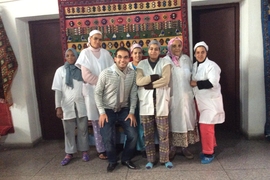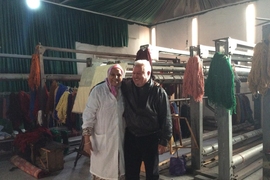Although tourism accounts for the second-largest industry within Morocco’s economy, many Moroccan craftsmen who depend on tourism to earn their living still face significant economic hardship, as a growing percentage of international retail transactions are being conducted online.
Having witnessed this struggle firsthand on a trip through the Atlas Mountains, MIT Supply Chain Management graduate student Zyad El Jebbari, a Morocco native, was motivated to find innovative new ways to help his country’s craftsmen leverage the opportunities provided by a globalized economy. Now, with his creation of MoroCrafts, Moroccan artisans will be able to use an online platform to directly market and sell their handcrafted goods to a global customer base.
“I felt that there was an urgent need for young Moroccans to take action through entrepreneurship to help our artisans broaden their horizons and reach,” El Jebbari says. “My main objective is to create a platform referencing the products made by local artisans, set up an authentic Moroccan brand that consumers can trust, and serve as a bridge between my country and the demand coming from all around the world.”
According to UNESCO reports, Morocco still maintains a high illiteracy rate of more than 35 percent, primarily among the socioeconomic demographic that comprises many local craftsmen. A lack of literacy provides a challenging barrier to access the modern distribution channels of today’s fast-growing market demand for handmade goods.
Current models for exporting and selling goods from developing countries via “middlemen” retailers often place craftsmen at the bottom of the supply chain, where they receive the least benefits. These artisans often rely on microcredit loans with high interest rates to fund their initial production, and can expect to see an average return of only 5 to 20 percent of the retail price of their goods.
“The supply chain design behind MoroCrafts is part of Zyad’s business strategy,” says Edgar E. Blanco, a research director at the MIT Center for Transportation and Logistics and a MoroCrafts advisory board member. “It provides not only more transparency but also a connection between consumers and artisans, often lost in global supply chains.”
MoroCrafts aims to increase artisan earnings by up to 70 percent of retail price through maintaining a "low-to-no" inventory model in which artisans only produce crafts that are requested and prepaid for by consumers. The platform will also provide interest-free credit loans to artisans in order to ease barrier of entry, as well as guidance and services for local artisans to improve their processes, designs, and administrative responsibilities.
Consumers will also benefit from the new platform in several key ways.
-
Guaranteed handcrafted authenticity and quality control.
-
Direct communication with craftsmen via ratings and direct messaging.
-
More choice in the products they can buy.
“MoroCrafts represents a fundamental shift in the fair-trade industry,” El Jebbari says. “Our vision is to broaden the Moroccan artisans’ horizons and enable them to improve their standards of living. This has broader implications in improving the region’s business and cultural dynamism and ultimately puts in place a sustainable economic model that will help reduce poverty in the country. Instead of offering charity to these regions, we are planning on opening them up to the world and removing them from isolation.”
A Kickstarter campaign launched on Jan. 17 aims to reach a goal of $10,000 in order to help fund the project, along with seed grants from the Legatum Center. El Jebbari has also entered his project into the MIT IDEAS Global Challenge competition. MoroCrafts plans to expand its platform to other African countries within the next five years.














